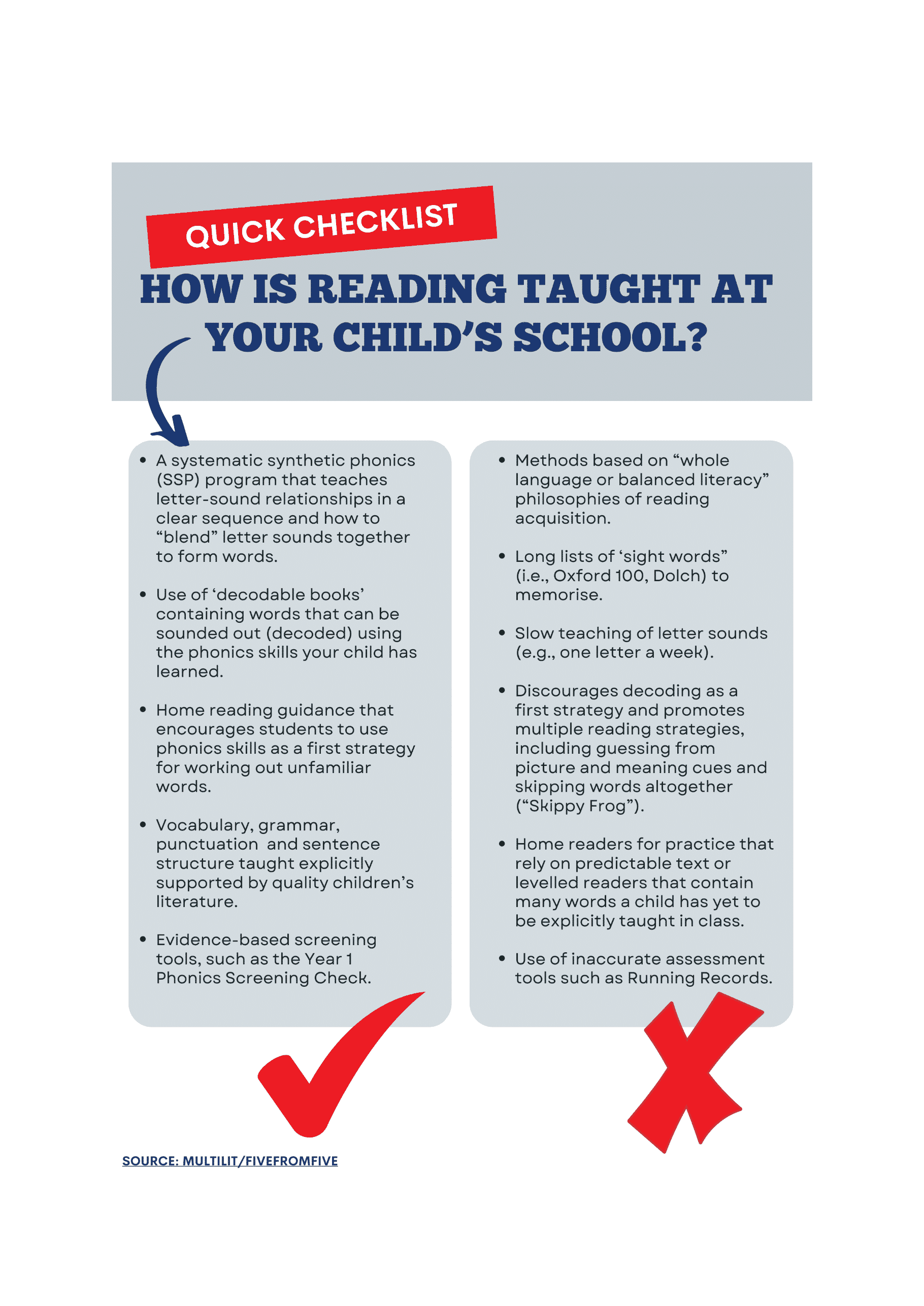New checklist helps families tell if their child’s school is teaching reading right?
How children learn to read – and the best way to teach them – has been extensively researched over decades, with the explicit teaching of phonics and other key foundational language skills found to be the most effective.
To help families establish whether schools are using the most effective methods for teaching reading, MultiLit in conjunction with its community education initiative Five from Five – have developed a quick checklist showing hallmarks of an evidence-based literacy classroom and good teaching of reading.
Phonics? Tick. Explicit instruction? Tick. Characters such as ‘Skippy Frog’ or ‘Eagle Eye’ that teach children to skip words or guess from picture clues? Sound the alarm bells!
Leading education researcher and program developer MultiLit has today released a checklist for families to help them establish whether their child’s school is using the most effective methods for teaching reading.
MultiLit senior research fellow, Dr Jennifer Buckingham OAM, said how children learn to read – and the best way to teach them – has been extensively researched over decades, with the explicit teaching of phonics and other key foundational language skills found to be the most effective.
However, this had not stopped many schools from employing multiple strategies that produce highly variable outcomes in early literacy classrooms, she said.
“Navigating the start of school can be challenging for parents, who most likely won’t be aware of the empirical evidence around the teaching of reading or know how to identify high quality, effective instruction,” said Dr Buckingham.
“Unfortunately, we still have too many schools claiming to use multiple strategies to teach reading, which often indicates they are relying on whole language or balanced literacy approaches that are inferior to explicit and systematic phonics teaching and leave too many children struggling, or worse, falling through the cracks.”
According to the checklist – developed by MultiLit in conjunction with its community education initiative Five from Five – hallmarks of an evidence-based literacy classroom and good teaching include:
- A systematic synthetic phonics program, such as MultiLit’s InitiaLit, that teaches letter-sounds relationships and how to “blend” those sounds to form words.
- Use of ‘decodable books’ containing words that can be sounded out (decoded) using the phonics skills your child has learned.
- Home reading guidance that encourages students to use phonics skills as the first strategy for working out unfamiliar words.
- Evidence-based screening tools, such as the Year 1 Phonics Screening Check.
Practices that are considered outdated or not supported by evidence – and are increasingly being discouraged by education departments – include:
- Long lists of ‘sight words” to memorise.
- Slow teaching of letter sounds (e.g., one letter a week).
- Discouraging decoding as a first strategy and instead promoting multiple reading strategies, including guessing from picture or meaning cues and skipping words altogether.
- Home readers that rely on predictable text or levelled texts that contain a multitude of words a child has yet to be explicitly taught in class.
- The use of inaccurate assessment tools such as Running Records.
“Not all literacy teaching strategies are created equal – many detract from the development of essential reading knowledge and skills, such as decoding, which needs to be practiced regularly to embed those letter-sound relationships into a child’s long-term memory,” Dr Buckingham said.
“Relying on predictable readers and promoting characters such as ‘Skippy Frog’ or ‘Eagle Eye’ might seem fun and harmless but all it does is instill unhelpful reading habits.
“As students’ progress through school and are required to read books without pictures and containing increasingly complex words, they often struggle unless they have honed their decoding skills.”
Dr Buckingham said Australia’s 2023 NAPLAN results – which revealed that more than 30 per cent of Year 3 students nationwide were not proficient in reading – served as a wakeup call, highlighting the need for evidence-based practice across all schools in all school systems.
She encouraged parents to ask questions of their child’s school about how and why they used particular approaches, programs, and resources and ask about the evidence behind their choices. They should also ask for their child’s reading skills to be assessed if they are concerned about their progress.
Information on evidence-based effective reading practices, for parents as well as teachers is available on the Five from Five website.
